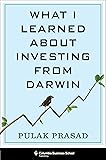
What I Learned About Investing From Darwin

This gets us to the paradox I mentioned at the start of the chapter. Given multiple levels of robustness, how in the world do species evolve? Should they not stay fixed? What propelled bacteria to become bonobos? The short and incredible answer is that robustness itself leads to evolvability!
Pulak Prasad • What I Learned About Investing From Darwin
Chapter Summary Evolutionary theory has taught me that . . . . . . to avoid getting drowned by a deluge of data and information, we can reimagine investing by initially selecting a single business trait that brings with it many favorable business qualities. 1. In nature, selection for just one trait can influence many other behavioral and physical
... See morePulak Prasad • What I Learned About Investing From Darwin
A Consistently High-ROCE Business Allows Companies to Take Business Risk Without Taking Financial Risk, Which Increases the Chance of Business Success
Pulak Prasad • What I Learned About Investing From Darwin
A Consistently High-ROCE Business Allocates Capital Well
Pulak Prasad • What I Learned About Investing From Darwin
All long-term investors, mentored by more than five decades of Buffett’s letters and annual meetings, demand that companies have a “sustainable competitive advantage” (SCA). But how does one go about assessing whether a company has an SCA? If you peruse business and investment books, the sources of SCA turn out to be the usual suspects: brand,
... See morePulak Prasad • What I Learned About Investing From Darwin
A Consistently High-ROCE Business Is Likely to Have a Strong Competitive Advantage
Pulak Prasad • What I Learned About Investing From Darwin
For an acquisitive company, we also include the capital invested in acquiring businesses, but let’s keep things simple for the moment.
Pulak Prasad • What I Learned About Investing From Darwin
What about total capital employed? This typically comprises two factors: net working capital and net fixed assets. In the net working capital number, we like to exclude excess cash (i.e., cash minus debt if cash happens to be much greater than debt) because extra cash is not an operating asset.
Pulak Prasad • What I Learned About Investing From Darwin
At Nalanda, here is what we begin with while short-listing businesses: historical return on capital employed (ROCE).